Canadian Soto Zen Temple Survives Fire, Floods
Written by: Reverend Aurelian Giles
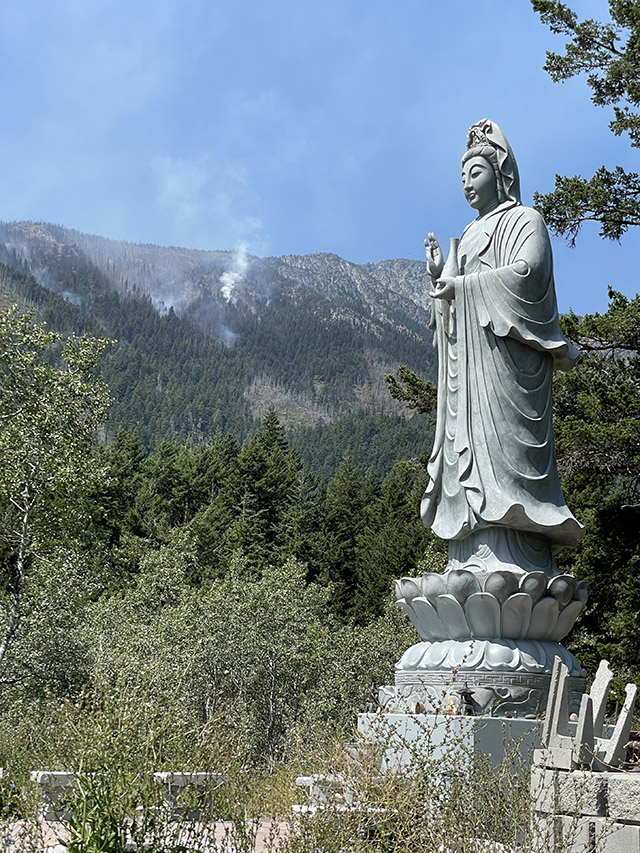
The Lions Gate Buddhist Priory Kwan Yin statue, with spot fires still burning on the mountain.
Photos by: Reverend Aurelian Giles
Over the last year our small Soto Zen monastic community experienced onslaughts of fire, heat and rain, vividly illustrating the Buddha’s teachings on impermanence and unsatisfactoriness.
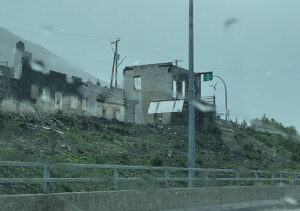
The neighboring town of Lytton, destroyed by the fire.
Lions Gate Buddhist Priory was founded as a center of contemplative practice on 160 acres of forested mountain land, nearly 200 miles northeast of Vancouver, B.C. The three disasters we faced over the last year pushed us to deeply tap the fruits of our practice, in ways we never could have anticipated.
First, in June, an unprecedented “heat-dome” sent temperatures to 121 degrees Fahrenheit. This was a record temperature for Canada, the highest temperature ever recorded this far north anywhere in the world.
Second, on the hottest day of the heat wave a devastating fire started in the nearby village of Lytton. The fire destroyed the town in minutes.
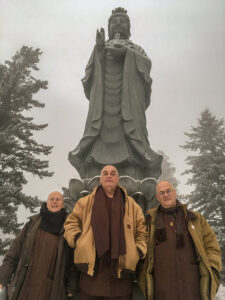
The monastic community. L-R: Rev. Valeria Allison, Reverend Master Koten Benson, Rev. Aurelian Giles.
The third disaster, a November flood, is one we are still reeling from.
In mid-November an “atmospheric river” of intense rainfall caused 100-year floods throughout the entire southern region of British Columbia, destroying roads and infrastructure over a wide area. The waters washed away entire sections of highways, bridges, power lines, and homes. Many towns were evacuated. Landslides caused numerous deaths.
For several days we were cut off from any services. Even weeks later only one route remained open to the coast, and one other to the interior. Fortunately for us our property and buildings were not directly affected.
The summer’s fire erupted on June 30, which was the hottest day of the year, the day before Canada Day.
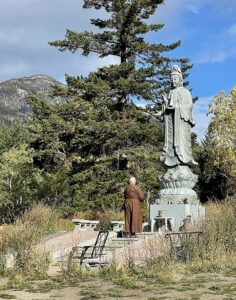
Rev. Koten offering incense at the Kwan Yin statue.
The fire was intense, hot, fast and destructive. Within 26 minutes the entire town of Lytton, and the surrounding Indigenous reserves, were engulfed in flames. People fled in all directions with only the clothes on their backs.
Tragically two people died, and it is considered a miracle there were not more deaths.
Driven by strong winds, the fire quickly spread into our valley, forcing us to evacuate the monastery. Our resident lay person had to flee north with our temple animals, over rough backroads.
Perhaps luckily two of our monks were already away in Hope, B.C., a town south of our village, while the third was in the U.S. For almost two months we had to live away from the priory, in hotel rooms and people’s houses, sometimes together, sometimes apart.
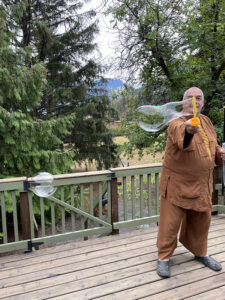
Rev. Koten Benson making bubbles during the evacuation.
The first few weeks were especially difficult, as we could get no solid information regarding the extent of the fire and the condition of our property. As it turned out nobody in our valley lost their homes, but most of our friends living in the village were less fortunate.
The town of Lytton is 90 percent destroyed. Gone are amenities including medical services, post office, grocery stores and pharmacy, and we are still adjusting to the new reality.
We did our best to keep a semblance of monastic practice during this time, meeting each night in one another’s rooms for meditation and scripture recitation, and holding Zoom meetings with congregation members twice a week. We continuously offered the merit of our practice to all the beings who had been affected by the fire, which grew over the summer into the largest wildfire in the province.
We were supported by an outpouring of generosity from friends and strangers. We are deeply grateful for all we received, materially and spiritually.
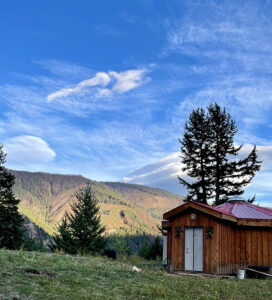
Mandala Hall, our new meditation building.
Our monastic community has never been large, and our existence has always been what some might call “marginal.” Built on the slopes of Botanie Mountain, our priory is part of the Order of Buddhist Contemplatives.
Normally the priory is home to three full-time Buddhist monks, and a varying number of lay residents who come for short or extended stays. We practice in the Serene Reflection Meditation Tradition (J: Sōtō Zen; Ch: Ts’ao T’sung Chan).
The priory began when a small group of students of Reverend Master Jiyu Kennett, founder of our order and first abbess of Shasta Abbey in California, formed a meditation group in 1974 in Vancouver.
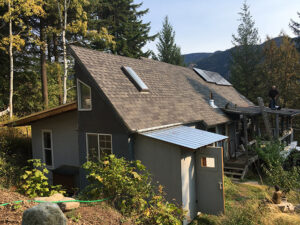
Bodhidharma Hall, our living quarters.
Eleven years later Reverend Master Koten Benson, who was originally from Newfoundland, moved back to Canada from Shasta Abbey where he had been training. The Vancouver group invited him to stay, and the priory was officially established in 1985.
For 22 years Reverend Benson taught and trained with the group in various rental houses in the city. In the early 2000s we purchased the rural property, to meet the needs of the growing monastic community.
Lions Gate Priory is off the grid, powered by solar electricity, heated by wood-burning stoves, with running water and an outhouse toilet. We have a small shared living area, and some smaller huts and cabins.
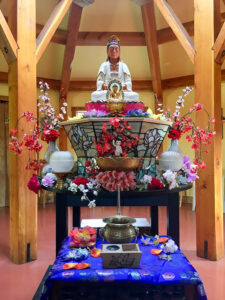
The main altar in Mandala Hall.
We recently constructed a meditation building modeled on the traditional pit-houses of the local First Nations (Indigenous peoples), and built by the nearby Skeetchestn Indian Band.
A few years ago a Vietnamese monastery near Vancouver gave us a 10-ton granite statue of Kwan Yin, the bodhisattva of great compassion. Moving the 20-foot statue up the mountain was a big undertaking, but that’s a story for another day.
Our practice consists of a daily schedule of meditation, daily ceremonies, study and work. We live a simple monastic life, “chopping wood and hauling water,” as we endeavor to plant a mandala of the Buddha dharma in the mountains.
Reverend Aurelian Giles received the Buddha’s precepts as a lay Buddhist in 1986. He was ordained as a novice monk in 1999 by Reverend Master Koten Benson, and completed his novice training at Shasta Abbey and with his master in Vancouver. Giles received dharma transmission in 2004, and was named a master in 2010.
